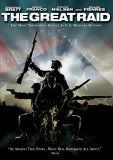
June 6, 2008
The Great Raid (2005)
Should I see it?
Eh...sure...although, if you don't, you're not missing much.
Eh...sure...although, if you don't, you're not missing much.
Short Review: The mediocre raid.
There have been many attempts to express the torture American soldiers endured at the hands of The Japanese during WWII. Like To End All Wars, this film goes out of its way to show the brutality of the Japanese P.O.W. camps in an unfiltered and realistic fashion. This movie also shares another quality with that film, it is painfully slow. We come to get a glimpse at how low humans can drop when personal honor is cherished over personal morality. In this respect, this film is successful. The viewer does come to understand how bad it was for the prisoners. This film fails, however, because beyond this weighty point, there is little else of note.
This film primarily suffers from a clear lack of direction. The structure of the film is built from two stories that are split into three portions. That sounds fun doesn’t it? There is the drama of the prison camp where Major Gibson, played wonderfully by an intense Joseph Fiennes (Luther), tries to control his men while he is slowly dying of malaria. The second portion is dedicated to Margaret (Connie Nielsen (Gladiator), Major Gibson’s unrequited love. She struggles to remain free while operating a local underground movement and smuggling drugs to the P.O.W. camp. This makes up one of the two stories told in this movie. This would have been a successful production if this was the extent of the narrative. There is enough here to make a deeply moving story about the separated couple. Well, this is called The Great Raid not The Great Story About The Separated Couple - there has to be more.
Finally we have the last portion given to the actual raid. This is equally as interesting and potentially striking as the other plot lines in the film. Like the other plots there is enough content in this portion to make its own film. The raid section of the film holds some good content but could have been improved. James Franco and Benjamin Bratt offer strong performances although their roles don’t require much. It would have been better if the film had the time for character development and conflict. As it is, the raid is shoehorned into the film and the story suffers.
The central issue is that the plots have nothing to do with one another until the final act. While Gibson and Margaret go through their internal struggles, the raid is being massed and executed by people who otherwise have nothing to do with them. In a way it is like watching a movie on television and clicking over to another movie on another channel and then coming back. The actual raid seems to impose upon the film about the struggles of the suffering couple.
The piece as a whole is tragically disjointed. With the stories not connecting until the final moments and the complete lack of a centralized villain there is nothing pushing the story forward. We have a series of events that end without meaning, thus, no real reason to watch. I’ve said it before and I’ll say it again, a story requires a central villain. This forces a thrusting conflict against the hero and is used to move the story forward. Conflict demands a question be proposed to the audience; “Will the boy get the girl?” “Will the raid be successful?” “Will the hero get his goal?” Through the conflict that drives the story the storyteller and audience learn the answer to the central question. This answer gives birth to “the moral of the story”. If there isn’t a notable bad guy, there isn’t a notable conflict and thus there isn’t a notable moral to close the story. This is a first class ticket to an unsatisfying ending.
While I can’t tell you to avoid this one, there are some good scenes and some fine acting, I’m certainly not raving about this film. It is lukewarm, proceed with caution.
Related Review:
Another P.O.W. Movie
Rescue Dawn (2006)
Other Critic's Reviews:
The Armchair Critic
CinemaBlend
Labels: film, James Franco, Joseph Fiennes, movie review, war, World War II
Share
Previous Posts




Good News Film Reviews LLC 2004-2010 - used with permission
Images, video and titles are the property of their respective copyright holders. Good News Film Reviews LLC claims no ownership or connection to them.
The views expressed on this site are not the opinion of any advertiser or external entity.
While we take care to only link to responsible entities, Good News Film Reviews LLC takes no responsibility for the content linked from this site. There are sharks in the waters. Surf at your own risk.
The Template is generated via PsycHo and is Licensed.






















0 Comments:
Post a Comment
<< Home